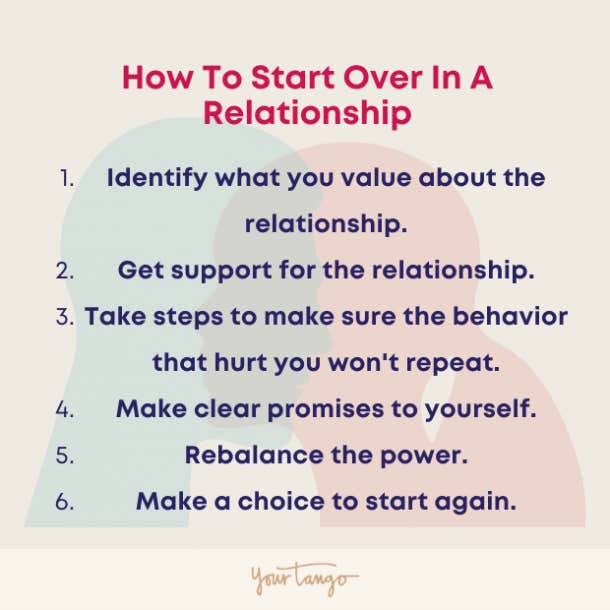As a couples therapist, I work with many couples who want to begin again after a recent betrayal or years of disappointment or distance.
Yes, couples can effectively learn how to start over in a relationship, but it takes a commitment to forgive and to develop new patterns and memories together.
This process is certainly not easy. Pain caused by someone close to you is a huge burden. The guilt can eat you up and make it almost impossible to have room to heal.
The good news is that almost nothing is irreparable. The realistic news is that it takes work. And the bad news is that some couples can’t seem to put that work in to get there.
But there are some couples who can. It’s really up to you and how badly you want to repair the relationship.
Many people probably want to go back to the way things were before there were problems. But you can never do that.
As a couple, you have experienced a lot more and have grown. So, you shouldn’t want the same old couple back, but a new couple that’s ready to take on the world together.
It’s hard to do on your own. Asking for help can be really beneficial, especially if you’re having problems communicating altogether. Asking for help is a sign of strength, not weakness, as some people might think.
You’re strong enough to accept every bit of help you can get because you want the relationship to work that much, and you’re willing to work through the emotional steps involved. It’s the best thing you can do.
How to start over in a relationship
1. Identify what you value about the relationship.
When we are hurt, it’s tempting to focus on the difficult and less-than-appealing elements of our partners and our relationship. But couples who work through difficult times keep their eyes on the positives, and can clearly say why they want to stay with this person and what they love about them.
This step can also give you clarity. If the only reason you can think of to stay together is that you dread the task of separating, that may not be enough to get you through.
By clarifying what has worked in your relationship, you can build on those things and stay motivated to do the repair work needed.
2. Get support for the relationship.
If it was easy to just press the reset button and get over the hurt, you would just do that. The truth is, if your friends and family have heard you complain about your partner month after month, they may support you but find it hard to support the relationship.
Also, if you and your partner are trying to be the only support for each other, you may find yourselves in a pattern of constantly having difficult talks about past hurts and how you’re feeling.
Therapy is great because it gives you an unbiased, experienced support person, and it allows you and your partner to focus time together outside of therapy on having fun together again, which is critical.

3. Take steps to make sure the behavior that hurt you won’t repeat.
This step is not about being naïve. This step is about figuring out what you and your partner need to change to convince you that the patterns that happened before are not going to happen again.
Couples that recover from relationship wounds can point to the things they each did to address the problems and make changes. They have a plan to address future problems before they grow. Folk wisdom tells us that we can’t forgive injuries that are still happening to us.
It’s hard to start over when you’re in the same old patterns. Both people have to be willing to change.
4. Make clear promises to yourself.
One of the fears people have is that if they forgive their partner this time, then maybe they will never stand up for themselves again. The big fear is actually not that their partner will take advantage of this; the big fear is that they can no longer trust themselves to set limits and enforce them.
In this step it is important to allow yourself time to reassess your own limits. So, maybe the things your 20-year-old self thought were unforgivable, are forgivable after all. This does not mean you have lost all right to relationship boundaries.
This is a conversation you need to have with yourself. The step to take is to forgive yourself for being someone who can get hurt and then to trust yourself anyway.
5. Re-balance the power.
Couples who create fresh starts for themselves have moved out of the blaming, punishing, reactive dynamics. They recognize that to move forward neither person can be stuck in the role of victim or bad guy.
An ongoing pattern of making amends or being the long-suffering martyr is not sustainable because it feels awful for both people.
You cannot move forward feeling like one person owes the other. You cannot move forward with one person being the vulnerable one.
At some point, the past wounds need to be put in the past, not to be forgotten, but to be taken out of active play, meaning that they will not be brought up in every new argument, they will not be thrown in anyone’s face, and that you feel you have genuinely worked through them and have resolution.
Then, you move forward as equals again.
6. Make a choice to start again.
Beginning again with a partner means making a clear choice to do so, to let the past rest, to take the risk of trusting again, and to love them more because you appreciate the work you have each put in to stay in relationship and you acknowledge the risk.
Will you ever have the starry-eyed “nothing will ever come between us” love again? No. Will you have the same relationship you had before? No.
But couples who give themselves a chance to restart find ways to value the depth of the relationship they have now. Ultimately, you unbreak your own heart by choosing to let it heal.





